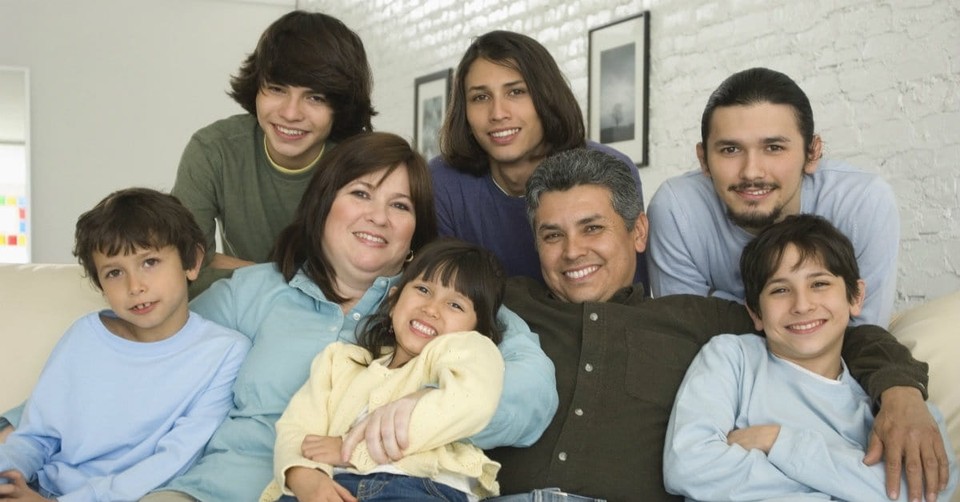Is a Large Family a Blessing or a Burden?

These days, having more than two children can unleash a tsunami of ire from family, friends and total strangers. "Breeders" has entered our vocabulary as a derisive term for those who have more than one or two kids.
"We believe that children who've been taught to serve God and work hard will grow up to benefit society, to be contributors. Twenty years from now we hope and pray that they will be the teachers, nurses, computer programmers, missionaries, mothers and fathers that our world will need at that time," says Mary Ostyn, author of A Sane Woman's Guide to Raising a Large Family and Family Feasts for $75 a Week. Ostyn lives in Nampa, Idaho with her husband and 10 children, including six adopted kids, ranging in age from 5 to 22 (six girls, four boys).
Ange Coburn, a Gilbert, Ariz., mother of 11 children ranging in age from 20 to six-month-old twins (four girls and seven boys), says she and her husband "opened our hearts to receive as many children as God would like to give us."
"Children are a gift from God—why turn down such treasures?" says Melanie Jeschke, who lives in Vienna, Va., with her husband and nine children ranging in ages from 16 to 31 (three girls and six boys).
Historical Perspective
U.S. fertility rates reveal that large families used to be the norm in this country. In 1800, the total U.S. fertility rate was 7.04 children per woman, according to the U.S. Census Bureau. By 1850, that number had dropped to 5.42, before falling even further to 3.56 in 1900. The U.S. fertility rate continued to decline throughout the first half of the 20th century before rising briefly to 3.53 in 1960. The rate bottomed out at 1.77 in 1980 and has been on a slow rise ever since. The U.S. Census Bureau estimates that the total U.S. fertility rate for 2009 is 2.05—the same as it was in 2000.
While the overall fertility rate has been dropping, so has the number women having more than three children. Census data shows that in 1976, 59 percent of women between the ages of 40 and 44 had three or more kids. Three decades later, the percentage of women in that age group with three or more children had decreased to 28 percent.
Ostyn says the shift to smaller family size can be partly attributed to the move away from an agriculture society, in which lots of children were helpful for farming the land. "I think [smaller families are] also related to the recent generations' devaluing of children themselves, of seeing them as burdens instead of the blessings that God declares them to be," she says.
Cogburn contends that greed and fear contribute toward the downsizing of the American family. "We live in an age where generally people seek happiness in the worldly definition of success—make more money and buy more things. Many do not want to give of their time or give up whatever is required to have more children," she explains.
"They also do not want to bring more children into a world that is growing more evil everyday. I look at it as an privilege, for we have an opportunity to raise godly children who will make a difference in this fallen world," says Cogburn.
Family Resources
One of the charges levied at large families is that those units consume more than their fair share of resources. Jeschke responds that much of the developed world is actually experiencing a birth dearth, not a baby boom. "Countries like France are even subsidizing couples to have children," she says. "I also believe that Christians are one of the earth's most important resources."
"Most large families actually use resources very carefully," counters Ostyn. "Clothes and baby items get used over and over, and less money is wasted on frivolous things, because every dollar needs to stretch. My friends with large families tend towards all sorts of environmentally wise choices—cloth napkins, line-drying clothes, limiting errand-running to certain days of the week, cooking mostly at home—simply because these things also save money."
Another argument against large families is that it's more difficult to parent more than two children. "We've always said, once you had three children, you were outnumbered, so it didn't matter how many children you had after that," says Jeschke.
"There is probably not a lot of huge differences where discipline is concerned," Cogburn points out. "However, I think with a smaller family it is easier for Mom and Dad to do a lot of the household chores for the kids. We have taught our children starting at a young age to do chores. In addition, the older children learn to help the younger children, which teaches them about otherness and selflessness—a rarely found quality today."
Ostyn concurs. "Kids in big families routinely pitch in and work together. The experience they get compromising and thinking of others is a great preparation for adulthood, whether in the board room or the living room. Of course, kids in smaller families can learn these values, but it happens more organically in a large family."
Faith and Family Size
These women say their faith has informed their decisions to have large families. "We started out having a slightly larger-than-average family, with two girls and two boys, just because we enjoyed parenting," says Ostyn. "Once we had four kids, we decided we were ‘done.' But about three years later, I began longing for another baby, and at the same time our eyes became opened to the kids in the world who need a family, so we ended up adopting six more children from South Korea and Ethiopia."
"We believe children are a blessing and a reward from God. We believe that investing in our children's hearts and lives will reach much further and make a greater impact on the world rather than investing in the material things of this world," says Cogburn.
"We believe the Lord wanted us to trust Him with the number of children we had," says Jeschke, "just as we trust Him with every other aspect of our lives."
As with any size family, there are joys and difficulties with raising a large family. "One is never lonely in a large family," jokes Jeschke. "Seriously, though, we have multiplied our ministry and our impact for Christ on our world, which makes it [easier to bear] the lack of time and privacy, and the juggling of multiple schedules."
For Oystn, watching her children together is one of her joys. "Sure, there are times when they fight, but much of the time they truly enjoy each other. Sometimes people fear that kids in a big family won't get enough attention. But having a big family is not about depriving kids of relationships—it is about providing them with more people to love and who love them," she says.
"Watching how the dynamics of family is the best growing ground for character, fellowship, and the building and strengthening of authentic relationships. This includes strengthening of our marriage as well," adds Cogburn.
How Many Children?
These three women offer advice for couples deciding what size fits their family.
Ange Cogburn, mother of 11: "God has a perfect plan for every family. The key is to lay our families at His feet. Ask Him to guide and direct you in this area. He may only give you one, He may give you 12. Or God may bless you through adoption or foster parenting. We must not compare ourselves to other families but look only to the Lord who has the blue print of your life already composed."
Melanie Jeschke, mother of 9: "According to the Scriptures, the Lord can open and shut the womb. Seek Him. Ask Him to guide you and show you His will. Trust Him to act according to His plan and purpose for you life."
Mary Ostyn, mother of 10: "I'm not sure if there is one ‘right' number for everyone, but I would encourage folks to be open, to pray together, to search the Scriptures and to actively seek God's will. He may just be calling you to raise a larger family than you first envisioned. I'm a prime example because I swore as a teenager that I'd never have more than four kids, but I am so grateful to have been wrong about that."
June 9, 2010
Sarah Hamaker is a freelance writer and editor, and author of Hired @ Home: The Christian Mother's Guide to Working From Home. She lives in Fairfax, Va., with her husband and four children. Visit her at www.sarahhamaker.com.
Originally published June 07, 2010.





